Okay, forgive me the borderline clickbait title.[1] I’m writing this blog post not because I think I’ve found the answer, but because I’ve said to people things like ‘Oh yeah I started using Evernote and it’s brilliant’ without ever fully explaining why. It’s good for me, but it won’t be good for everyone. Similarly, I feel compelled to say that there are a bunch of options available, and Evernote is just the most obvious one.[2] With those caveats in mind, I’m going to try and briefly outline how I use the program, and how it has impacted the way that I go about doing research as an historian.
What is Evernote?
It’s a program that you can download on your computer, tablet, phone, and probably even microwaves with a smart chip in them now. It’s everywhere. It has two levels: free and premium, and there’s probably a free trial of the latter (and that’s the one you’re gonna want). It offers you ways to organise files and information, and basically provides an easily navigable GUI for your documents. One of the things that attracted me to it the most is that it allowed me to seamlessly move between documents in folders without losing sight of the original directory – this is especially handy if you’re looking for something that you know exists but don’t know exactly where you put it or what you called the file. Everything is classified in to ‘Notes’, which are best thought of as a catch-all term for a file. A note can be just text, it can be images, it can be a PDF, it can be a sound file. All of these can be sorted and accessed as notes. These notes are stored in Notebooks, which are basically folders. You can see my interface below.[3]
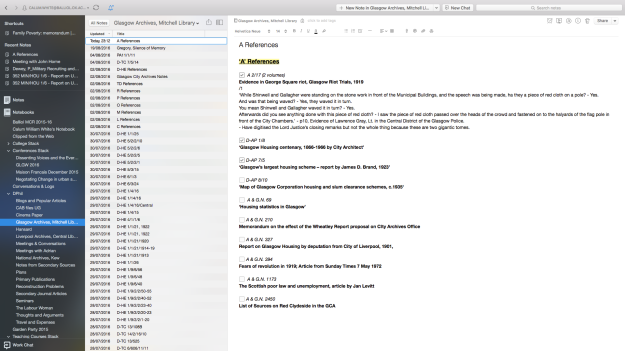 This should all be pretty clear, but if clarifications are required I’m happy to (try) to help. Is this customisable? Probably. I’ve never been unhappy with the standard system so haven’t tried. As you can see, the main folders are on the left, the list of the notes is in the next column, and the note itself is in the right. In this case, it’s my master list of files and descriptions, all of which I have boxes next to and tick once I have received and viewed the document. All of those correspond to a file on the left, where I can view the original.
This should all be pretty clear, but if clarifications are required I’m happy to (try) to help. Is this customisable? Probably. I’ve never been unhappy with the standard system so haven’t tried. As you can see, the main folders are on the left, the list of the notes is in the next column, and the note itself is in the right. In this case, it’s my master list of files and descriptions, all of which I have boxes next to and tick once I have received and viewed the document. All of those correspond to a file on the left, where I can view the original.
Why is it good for archival work?
This in itself isn’t very impressive, and you’re probably pretty happy with how things are laid out in your own peculiar archive note system. That’s fine. What Evernote does do very, very well, however, is make collecting material much more simple. For this to happen, you do need to have a smartphone, and it does need to be capable of taking the photos at a decent enough quality for you to use the source. Given that mine did this in 2008 without problems, this should be fine for most people. Download the app. If you’re really clever, put the widget on your phone’s desktop. Now it’s possible to take the photos directly, in sync, and save them to the place they’re supposed to go. I’m not in the archive so I can’t do this with a primary source, but let’s pretend that Adrian Gregory’s ‘The Silence of Memory’ is actually one of my documents from the Mitchell Library, and I want to quickly photograph it in full.[4] It’s quite late when I’m doing this, and Balliol College Library is a dark place, so you can expect the photos would be better otherwise.
First, go to the place on the phone where the widget is and click the camera button. It will bring up the below interface. Opening the app, clicking the ‘+’, and choosing ‘Camera’ will work too. Both will bring up the document capture interface, shown below.
Once you’ve done that, I personally recommend clicking the top right and putting it in ‘Manual’ mode. Automatic is a function where it will try to be fancy and make the document seem like it’s been scanned in – it gets confused by lines and our weird archival documents though, and can create problems. Stick to manual. Take as many photos as you like, and watch the timeline in the bottom get populated. How many you can take depends on the capacity of your phone’s memory – if you do TOO many it’ll crash. If your document is really big I split it up in to parts every 70 or 80 pages or so. If you think the image was blurry or missed out something, simply take another – it’s very easy to delete them from the document later.
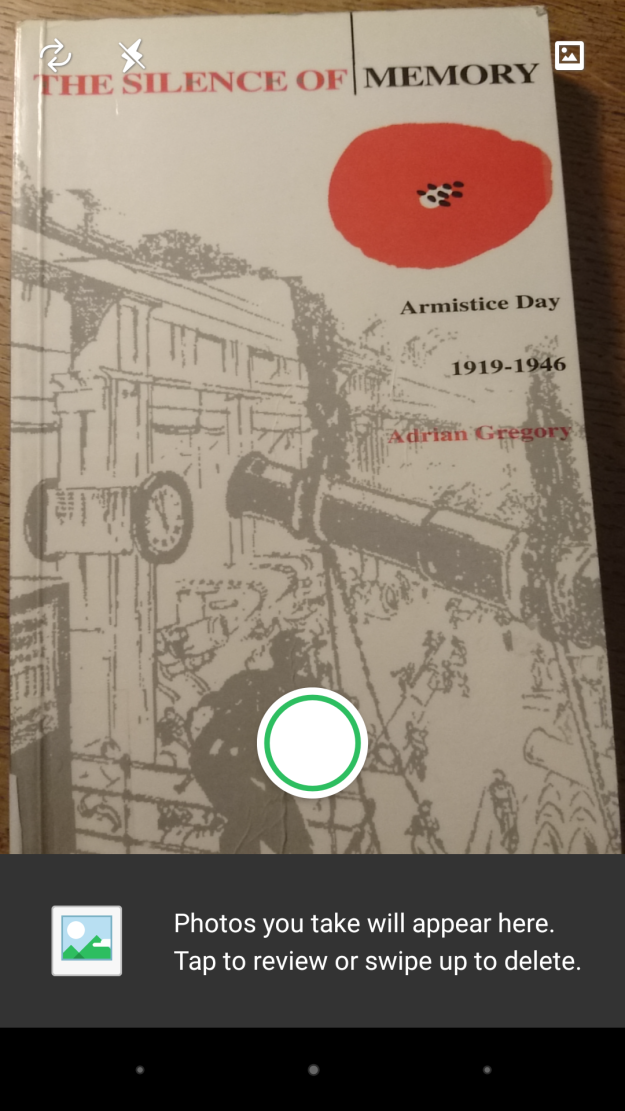
Once you’re done, click on the green tick and it’ll create your note ready for you. Write the name, and choose the notebook to save it to. It will then save the document there and, if you have internet on your phone, upload it to Evernote. Automatically backed up – hurray!
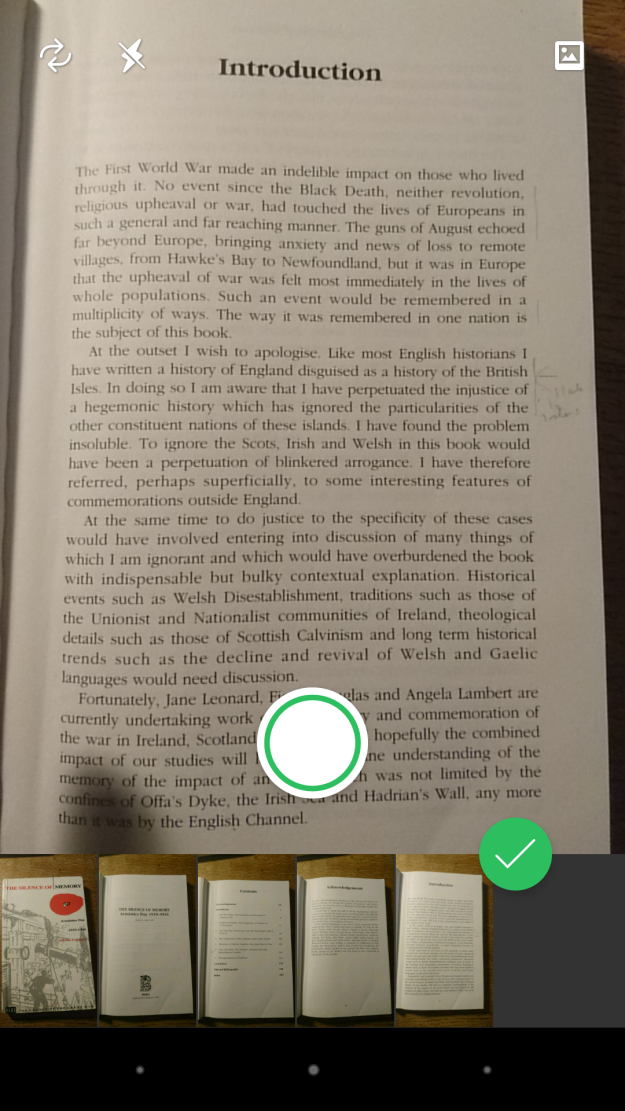
Let’s go back to the interface now and see if it’s appeared. A quick scan and a refresh, and it’s on my computer in case I need it. You can double click the files and they will maximise to full screen, and even put it in a slideshow mode if you’re incredibly easily distracted.

It doesn’t simply mean that it’s much faster to capture and accurately save documents, however. In addition, it will do its best to make all text automatically searchable (using the top right box), and for typed sources it is pretty good at this. It does this in the background so it won’t be instantly searchable, but give it a short while and it will. You can add tags to the document in case it’s less clear, e.g., ‘really useful account of flytipping’, but this isn’t essential. This searchable-ness (this is an ironic example of me searching for the right word unsuccessfully) is a premium feature but worth it, I think.
Can I use it for other things?
That’s how I use it for archives. It’s changed how I capture data – instead of spending longer arranging images in to PDF files than I spent in the archive, by the time I get home it’s already done and easy to view – and it’s changed how I can access that data. The search functions aren’t infallible and you still need to read things, but it’s incredibly helpful for finding quotations in a hurry, or finding that reference you forgot to footnote.
I’ve also used it as my primary PDF viewer, uploading every journal article I have to another folder and viewing it there. These are also searchable, and with premium you can annotate the files on your laptop or tablet and the annotations will sync, and also it will place any notes you’ve made on the files at the top of the document in an ‘annotation summary’ (see below).
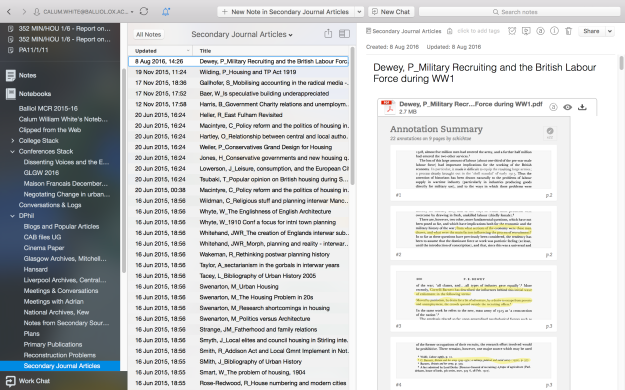
I clip and send things to it from the web all the time. For browsers you can download a plugin that will do this. For anything on your phone, simply click ‘Share’ and ‘Send to Evernote’ and it will store the entire page for you automatically to sort through later. If I’m walking around and see a CfP on Twitter, I’ll send it to Evernote and find it later.
Similarly if there’s a conversation with someone about work and they have a name or a reference or two, I’ll quickly open up the document on my widget and write it down and look it up later. This has helped me to keep all those things I otherwise wrote on scraps of paper or the backs of envelopes in one place (and again, searchable).
For those of you who take notes in seminars, a decision can easily be made. I experimented with typing my notes down directly in to Evernote, but I felt conscious at the noise the laptop made tapping away, and also tend to think about things differently when using a pen and paper. However, once I’ve been to a seminar or written a plan, I very quickly take a picture of it and send it to Evernote, and this gives me all the benefits of being able to find it again quickly, pick up things in searches, and back it all up instantly. (Here’s the plan of this post below, for example). You can even record audio at a low storage level, either on laptops or phones, but this is only of use for self reference and should never be relied on for anyone working with oral histories. (and don’t record people without them knowing, it’s rude).
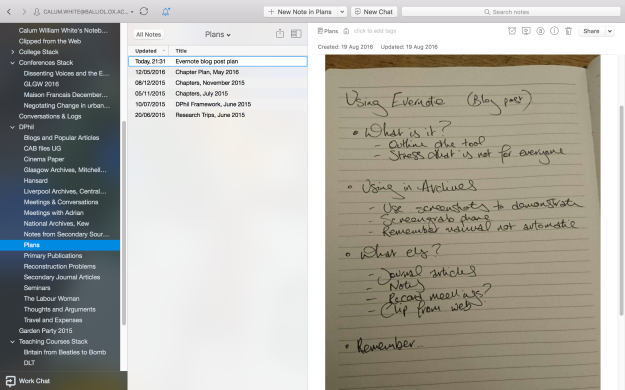
Is it for you?
If you don’t know by now, then I can’t help you any more. The primary goals are that it makes data capture and management in an archive easier, and that if you become more accustomed to the system it can streamline some other things too. If you’ve already worked for hours and hours in archives and have folders full of pdf files of documents already, that’s fine – I did too. Simply upload them to Evernote and make them searchable.
If you’re already happy with how you work and manage archives, then… well, why would you want to change?
I hope this has helped at least a few people (or at the bare minimum the couple of people who asked me to write this), and if you have questions don’t hesitate to get in touch – although I would stress I’m a consumer not a producer here, and I can’t help too much with anything technical.
Thanks for the longer than anticipated read.
Calum
[1] It was this or ‘So I started using Evernote, and you’ll never guess what happened next!’
[2] No, I don’t work for the BBC, but other options really are available.
[3] Please, don’t judge me for anything you see. Sharing this feels more intimate to me than being naked in front of you all.
[4] And I would want to, because it’s an excellent book. (What? What do you mean I’m only saying that because Adrian’s my supervisor and I’m sucking up as best as I can? How dare you?!)